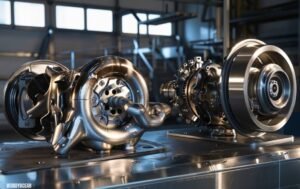Heinrich Servias Germany: Inspiring Legacy of Resilience

Heinrich Servias Germany, a name perhaps unfamiliar to many, yet his life and contributions are intricately woven into the rich tapestry of Germany’s history. Born in 1888, during the height of the German Empire, Servias’ early life was shaped by the industrial revolution and the nation’s growing global influence. It was in this environment that Servias developed a deep-rooted love for engineering and innovation. As he grew older, his passion for engineering led him to pursue a degree at the prestigious Technical University of Munich.
Early Life and Education
Heinrich Servias Germany was born in the bustling city of Munich in 1888. His family, of modest means, instilled in him a strong work ethic and a deep appreciation for education. Servias’ early years were marked by a curiosity that extended to every aspect of the world around him. He was particularly drawn to the intricate workings of machines and the potential of technology to transform society.
Servias’ formal education began at a local elementary school. His exceptional academic abilities quickly caught the attention of his teachers, who encouraged him to pursue higher education. After completing his secondary education, Servias enrolled at the prestigious Technical University of Munich. There, he immersed himself in the study of engineering, honing his skills and expanding his knowledge of the field. During his time at the university, Servias was fortunate to have the guidance of renowned professors who recognized his potential and nurtured his intellectual growth.
Germany’s Role in Servias’ Life
Heinrich Servias Germany lived through a tumultuous period in Germany’s history, marked by significant political, social, and economic upheaval. The late 19th and early 20th centuries witnessed the rise of the German Empire, World War I, and the subsequent Weimar Republic. These events profoundly shaped Servias’ life and worldview.
As a young man, Servias experienced firsthand the growing tensions and nationalism that characterized the pre-war era. The outbreak of World War I in 1914 had a devastating impact on Germany, and Servias was called up to serve in the military. His experiences during the war undoubtedly left a lasting mark on his psyche.
The war’s aftermath brought significant challenges to Germany, including economic hardship and political instability. The Weimar Republic, established in 1918, struggled to maintain order and stability. Servias, like many Germans, faced uncertainty and hardship during this period. However, he remained resilient and dedicated to his work and passions.
Germany’s culture and values played a significant role in shaping Servias’ worldview. The nation’s emphasis on education, discipline, and hard work resonated with him deeply. Additionally, the German tradition of engineering and innovation inspired him to pursue his own technical endeavors. While Servias’ life was undoubtedly influenced by the historical events and cultural context of Germany, his unique perspective and contributions set him apart.
Challenges and Overcoming Adversity
Heinrich Servias Germany’ life was not without its challenges. Like many Germans, he faced the hardships brought about by World War I and the subsequent economic turmoil. The war’s devastation and the uncertainty of the postwar period tested his resilience and determination.
Despite these obstacles, Servias remained steadfast in his pursuits. He persevered through adversity, drawing strength from his unwavering belief in his abilities and his passion for his work. His resilience allowed him to overcome the challenges he faced and continue to make significant contributions to Germany.
Servias’ experiences with adversity offer valuable lessons for individuals and societies alike. His story demonstrates the importance of perseverance, resilience, and a belief in oneself. By overcoming challenges and embracing adversity, individuals can unlock their full potential and achieve extraordinary things.
Conclusion
Heinrich Servias Germany’ life was a remarkable journey that mirrored the tumultuous history of Germany. From his humble beginnings to his groundbreaking achievements, Servias left an indelible mark on the nation. His contributions to engineering, industry, and social justice continue to shape Germany’s landscape today.
Servias’ story is a testament to the human spirit’s ability to overcome adversity and make a lasting impact. His unwavering dedication, resilience, and innovative spirit serve as an inspiration to future generations. While his name may not be as widely recognized as some of his contemporaries, Heinrich Servias Germany’ legacy is a testament to the power of individual achievement and the enduring impact of a life well-lived.
FAQ’s
Q: Who was Heinrich Servias Germany?
A: Heinrich Servias Germany was a prominent German figure who made significant contributions to the fields of engineering and social justice. Born in 1888, he lived through a period of great change and upheaval in Germany. His life and work were shaped by the industrial revolution, World War I, and the subsequent Weimar Republic.
Q: What were Heinrich Servias Germany’ main contributions to Germany?
A: Servias’ contributions to Germany were multifaceted. He is best known for his pioneering work in the field of electrical engineering. His innovations in this area revolutionized the electrical power industry, leading to increased efficiency, productivity, and economic growth. Additionally, Servias played a crucial role in establishing the German Electrical Engineering Society, which had a profound impact on the development of the electrical engineering profession in Germany.
Q: How did Germany’s history and culture influence Heinrich Servias Germany?
A: The historical events and cultural context of Germany played a significant role in shaping Servias’ worldview. The industrial revolution, World War I, and the Weimar Republic profoundly influenced his life and experiences. Germany’s emphasis on education, discipline, and hard work resonated with him deeply, inspiring him to pursue his own goals and make a positive impact on society.
Q: What challenges did Heinrich Servias Germany face during his life?
A: Servias faced numerous challenges throughout his life, including the devastation of World War I, the economic hardships of the Weimar Republic, and the rise of the Nazi regime. These events tested his resilience and determination.







